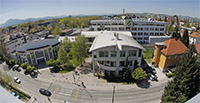How Internet arrived in Slovenia
The book “Don Quihote in Slovenia or how Internet arrived in Slovenia”, written by prof. Borka Jerman Blažič and published by the Publishing Company e-Besede, provides very detailed information in narrative form about all scientific research that has contributed to the development of the computer networks, which are now known as the Internet and Internet services.
In the book, the basic components of the Internet are described in the context of the protocol stack war that took part in the eighties of the last century between the academics on both sides of the Atlantic Ocean. The long-lasting war delayed the development of the open computer systems and networks until 1991, when the Internet communication model, known as communication between the server and user device, emerged victorious. The book points to the advantages of the Internet communication model, among which are the intermediate devices that connect the Internet protocol stack with the underlying communication infrastructure composed from different technologies. In addition, the author points out that the Internet is a communication infrastructure without central governance, as the only central Internet infrastructure is composed from the hierarchical Domain Name Servers Infrastructure (DNS), which is the main glue that interconnect the Internet networks. The DNS infrastructure provides the mapping between the device numeric Internet address to the mnemonic name of the Internet components, for example “www.ijs.si”.
In the second part of the book, the author presents the events around Slovenia in the process of independence that coincided with the actions for setting up the first Internet network in the country and its inclusion in the world Internet. The book also contains 100 original documents from that time.




